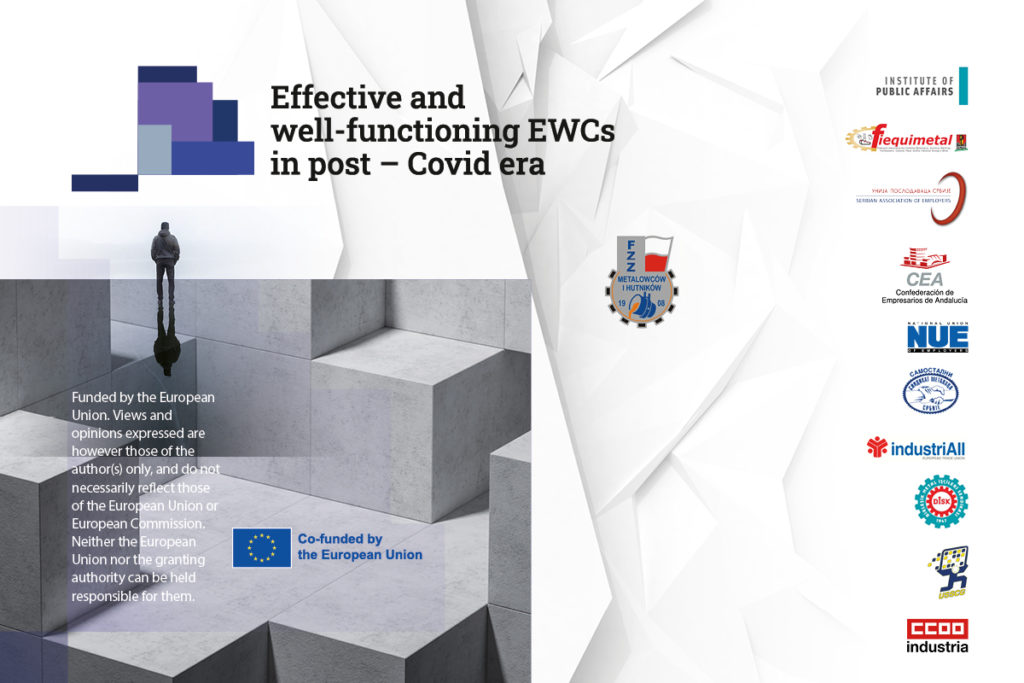„Effective and Well-Functioning EWCs in the Post-COVID Era” Project: Impact and Results Unveiled.
In an effort to fortify the resilience of European Works Councils (EWCs) amidst the turbulent landscape exacerbated by the COVID-19 pandemic, the European Union co-funded a transformative 20-month project, titled „Effective and Well-Functioning EWCs in the Post-COVID Era”. This initiative engaged trade unions, employers’ organizations and EWCs members across seven countries: Poland, Serbia, Portugal, Spain, Turkey, Montenegro, and Slovakia. The primary aim? To enhance the efficacy of EWCs in mitigating the fallout of the pandemic on the workforce.

Operating within an environment fraught with dynamic challenges, EWCs encountered multifaceted hurdles amplified by the pandemic. These challenges encompassed various aspects, including those stemming from the Twin Transition— the digitalization, automation, and greening of the economy, notably decarbonization.
Members of EWCs pinpointed additional obstacles such as fluctuating electricity prices, ramifications from the Ukraine crisis, and the volatile geopolitical terrain. As representatives of employees in transnational corporations, they accentuated the competitive pressures posed by non-European entities vis-à-vis their parent organizations.
In response to these challenges, the European Parliament adopted resolutions in 2021 and 2023, emphasizing the imperative of employee involvement at the company level to fortify workplace democracy and amplify EWC functionality. The 2021 resolution focused on information dissemination, consultation, and employee participation, advocating for a revision of the EWC Directive. Subsequently, the 2023 resolution aimed to bolster EWCs’ capacity for information dissemination and consultation, tailored to the diverse industrial relations systems across Member States.
On February 24, 2024, the European Commission proposed further amendments to the EWC Directive, signalling ongoing legislative endeavours. Active engagement from EWC members and social partners across Europe remains pivotal, with projects like ” Effective and Well-Functioning EWCs in the Post-COVID Era” serving as tangible manifestations of commitment.
Spanning from August 2022 to March 2024, the project encompassed a spectrum of activities to realize its objectives. The preliminary phase involved research conducted from January to April 2023, yielding national research reports for Poland, Slovakia, Portugal, and Spain. These reports provided invaluable insights into the current status, improvement areas, identified weaknesses, and stakeholder attitudes towards EWC development.
Subsequently, flipped training was implemented from July to November 2023, comprising three phases where participants received expert-developed materials to study before engaging in face-to-face training sessions. Training modules zeroed in on enhancing EWC operational procedures and addressing operational challenges to fortify workers’ rights to information, consultation, and participation.
Furthermore, video tutorials, based on flipped training content, were produced between October and November 2023 to bridge knowledge gaps and amplify EWC capabilities in navigating COVID-19-induced restructuring processes.
The pinnacle of the project manifested in the development of the „Effective EWC in the New Normality” assessment tool, crafted between November 2023 and February 2024. This tool empowered EWC members to evaluate organizational effectiveness and EWC contributions to defining company-level measures mitigating the pandemic’s impact. Dissemination of project results occurred through online seminars held across seven countries from February to March 2024, presenting key findings, the EWC assessment tool, research reports, training modules, and video tutorials.
In conclusion, the ” Effective and Well-Functioning EWCs in the post-COVID Era ” project emerged as a resounding success, equipping EWC members and social partners with the requisite tools to effectively navigate COVID-19-induced challenges. Through research, training, and tool development, the project fostered transparency and worker participation within multinational corporations, thereby facilitating the mitigation of pandemic-related challenges. The accessibility of project materials to the public underscores its broader impact on promoting EWC effectiveness and advocating for worker rights. All training content, video tutorials, and the EWC assessment tool are freely available to the public on the website http://startandgo-ewc.com/coursesslect. This online platform provides an unprecedented opportunity for those seeking to deepen their knowledge of EWCs and access essential resources for their effective development and implementation.

